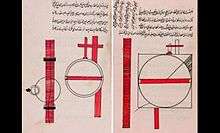Al-Karaji
| Abū Bakr al-Karajī | |
|---|---|
 Diagrams from Al-Karaji's work on "hidden waters" | |
| Born |
953 Karaj, Persia |
| Died | 1029 |
| Nationality | Persian |
Main interests | Mathematics, Engineering |
|
Influences
| |
Abū Bakr ibn Muḥammad ibn al Ḥusayn al-Karajī (c. 953 – c. 1029) was a 10th-century Persian[1] mathematician and engineer who flourished at Baghdad. He was born in Karaj, a city near Tehran. His three principal surviving works are mathematical: Al-Badi' fi'l-hisab (Wonderful on calculation), Al-Fakhri fi'l-jabr wa'l-muqabala (Glorious on algebra), and Al-Kafi fi'l-hisab (Sufficient on calculation).
Work
Al-Karaji wrote on mathematics and engineering. Some consider him to be merely reworking the ideas of others (he was influenced by Diophantus)[2] but most regard him as more original, in particular for the beginnings of freeing algebra from geometry. Among historians, his most widely studied work is his algebra book al-fakhri fi al-jabr wa al-muqabala, which survives from the medieval era in at least four copies.
In his book "Extraction of hidden waters" he has mentioned that earth is spherical in shape but considers it the centre of the universe long before Galileo Galilei, Johannes Kepler or Isaac Newton.
He systematically studied the algebra of exponents, and was the first to realise that the sequence x, x^2, x^3,... could be extended indefinitely; and the reciprocals 1/x, 1/x^2, 1/x^3,... . However, since for example the product of a square and a cube would be expressed, in words rather than in numbers, as a square-cube, the numerical property of adding exponents was not clear.[3]
His work on algebra and polynomials gave the rules for arithmetic operations for adding, subtracting and multiplying polynomials; though he was restricted to dividing polynomials by monomials.
He wrote on the binomial theorem and Pascal's triangle.
In a now lost work known only from subsequent quotation by al-Samaw'al Al-Karaji introduced the idea of argument by mathematical induction. As Katz says
Another important idea introduced by al-Karaji and continued by al-Samaw'al and others was that of an inductive argument for dealing with certain arithmetic sequences. Thus al-Karaji used such an argument to prove the result on the sums of integral cubes already known to Aryabhata [...] Al-Karaji did not, however, state a general result for arbitrary n. He stated his theorem for the particular integer 10 [...] His proof, nevertheless, was clearly designed to be extendable to any other integer. [...] Al-Karaji's argument includes in essence the two basic components of a modern argument by induction, namely the truth of the statement for n = 1 (1 = 13) and the deriving of the truth for n = k from that of n = k - 1. Of course, this second component is not explicit since, in some sense, al-Karaji's argument is in reverse; this is, he starts from n = 10 and goes down to 1 rather than proceeding upward. Nevertheless, his argument in al-Fakhri is the earliest extant proof of the sum formula for integral cubes.[4]
See also
Notes
- ↑ Selin, Helaine (2008). Encyclopaedia of the history of science, technology, and medicine in non-western cultures. Berlin New York: Springer. p. 131. ISBN 9781402049606.
Al-Karajī Abū Bakr Muh.ammad was a Persian mathematician and engineer.
- ↑ http://www-history.mcs.st-and.ac.uk/history/Biographies/Al-Karaji.html
- ↑ Kats, History of Mathematics, first edition, p237
- ↑ Katz (1998), p. 255
References and external links
- O'Connor, John J.; Robertson, Edmund F., "Abu Bekr ibn Muhammad ibn al-Husayn Al-Karaji", MacTutor History of Mathematics archive, University of St Andrews.
- Rashed, Roshdi (1970–80). "Al-Karajī (or Al-Karkhī), Abū Bakr Ibn Muḥammad Ibn al Ḥusayn". Dictionary of Scientific Biography. New York: Charles Scribner's Sons. ISBN 978-0-684-10114-9.
- J. Christianidis. Classics in the History of Greek Mathematics, p. 260
- Carl R. Seaquist, Padmanabhan Seshaiyer, and Dianne Crowley. "Calculation across Cultures and History" (Texas College Mathematics Journal 1:1, 2005; pp 15–31) [PDF]
- Matthew Hubbard and Tom Roby. "The History of the Binomial Coefficients in the Middle East"(from "Pascal's Triangle from Top to Bottom")
- Fuat Sezgin. Geschichte des arabischen Schrifttums (1974, Leiden: E. J. Brill)
- James J. Tattersall. Elementary Number Theory in Nine Chapters, p. 32
- Mariusz Wodzicki. "Early History of Algebra: a Sketch" (Math 160, Fall 2005) [PDF]
- "al-Karaji" — Encyclopædia Britannica Online (4 April 2006)
- Extrait du Fakhri, traité d'Algèbre par Abou Bekr Mohammed Ben Alhaçan Alkarkhi, presented with commentary by F. Woepcke, year 1853.
